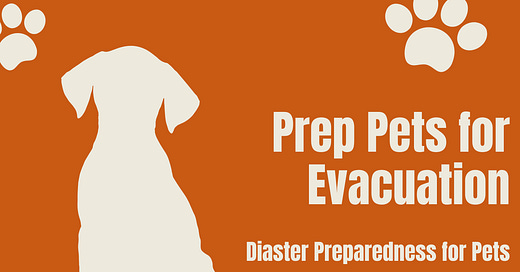PrepPets Clinic - Disaster Preparedness
Evacuation counseling, medical health screening & immunization updates to prepare your pet for safe and successful evacuation during disaster.
PrepPet Clinics (PPC)
Keeping animals safe, healthy, and well - is the mission of the animal’s family as well as the veterinary and animal-care professionals on their care team. The loss of animal life or injury / emotional trauma to animals during a disaster is traumatic for all the humans that care for animal wellbeing.
Any emergency or disaster that affects large numbers of people will affect animals, too. Companion animals depend on their human caregivers for daily needs like food and water, but also transportation and escape from dangerous situations - including evacuation during disaster.
Stressful events will always impact your animal - we can help them be both physically and mentally resilient despite those stressors.
Ensuring that your pet is safe during a disaster, and able to navigate the stress of evacuation successfully includes more than only having a go-bag prepped. Be proactive now - review your pet’s physiologic and psychologic health - help them be prepared for disaster.
Cultivate participates in the Front Range vMRC’s PrepPet Clinic (PPC) program. Access evacuation preparedness services via this program.
We host a PrepPet clinic at our Lafayette Waypoint once each quarter. See Our Calendar.
Reach out to schedule.




